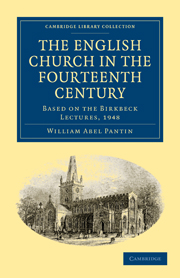Book contents
- Frontmatter
- Contents
- Preface
- List of Abbreviations
- I INTRODUCTION: THE LEGACY OF THE THIRTEENTH CENTURY
- PART I CHURCH AND STATE
- II THE SOCIAL STRUCTURE OF THE ENGLISH CHURCH
- III PATRONAGE AND THE USE OF BENEFICES
- IV PAPAL PROVISIONS
- V ANGLO-PAPAL RELATIONS
- PART II INTELLECTUAL LIFE AND CONTROVERSY
- PART III RELIGIOUS LITERATURE
- Appendix I The Latin text of passages quoted from manuscript sources
- Appendix II Two collections of didactic treatises
- Index
V - ANGLO-PAPAL RELATIONS
Published online by Cambridge University Press: 10 November 2010
- Frontmatter
- Contents
- Preface
- List of Abbreviations
- I INTRODUCTION: THE LEGACY OF THE THIRTEENTH CENTURY
- PART I CHURCH AND STATE
- II THE SOCIAL STRUCTURE OF THE ENGLISH CHURCH
- III PATRONAGE AND THE USE OF BENEFICES
- IV PAPAL PROVISIONS
- V ANGLO-PAPAL RELATIONS
- PART II INTELLECTUAL LIFE AND CONTROVERSY
- PART III RELIGIOUS LITERATURE
- Appendix I The Latin text of passages quoted from manuscript sources
- Appendix II Two collections of didactic treatises
- Index
Summary
The relations between England and the Papacy during the fourteenth century can be divided roughly into three periods: the first from about 1300 to about 1342; the second from about 1342 to about 1360; and the third from about 1360 to the end of the century.
THE FIRST PERIOD (1300–1342)
This period covered the last years of Edward I, the reign of Edward II, and the early years of Edward III, and among the popes, the early Avignon popes, Clement V (1305–16), John XXII (1316–34) and Benedict XII (1334–42). It was on the whole a period of fairly smooth relations. In the last years of Edward I's reign, the great struggle with Boniface VIII was over, and the king was able to get from the compliant Clement V much of what he wanted, such as the suspension of Archbishop Winchelsey and a share in papal taxation. Such things benefited the king but not his subjects, and we can begin to see a divergence of interest and opinion between the two. The resentment of the laity against such things as provisions and papal taxation expressed itself at the Parliament of Carlisle in 1307, in the statute forbidding the export of money, but this was partly nullified by the king's action.
Under Edward II and in the early years of Edward III, the Papacy was established at Avignon. The effects of this upon Anglo-papal relations were not so bad before the outbreak of the Hundred Years War.
- Type
- Chapter
- Information
- The English Church in the Fourteenth CenturyBased on the Birkbeck Lectures, 1948, pp. 76 - 102Publisher: Cambridge University PressPrint publication year: 2010First published in: 1955

